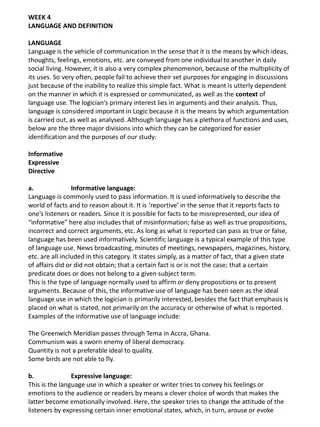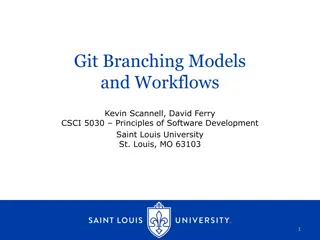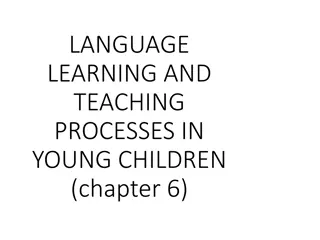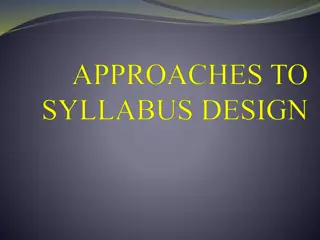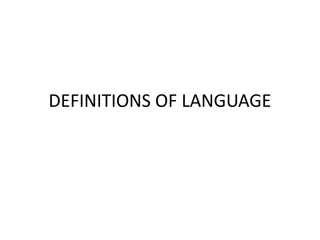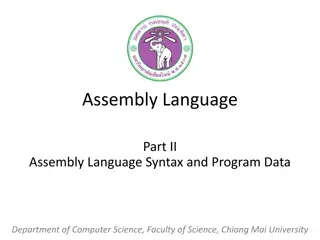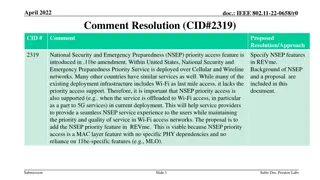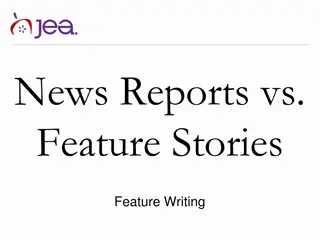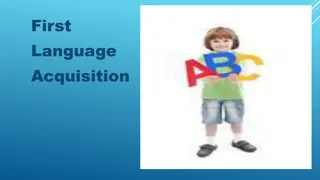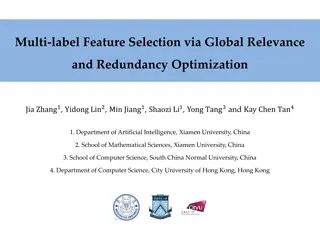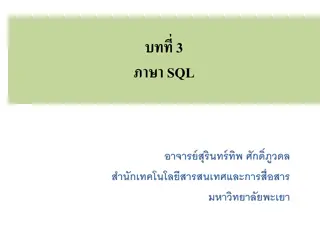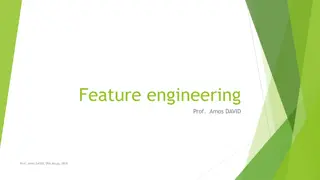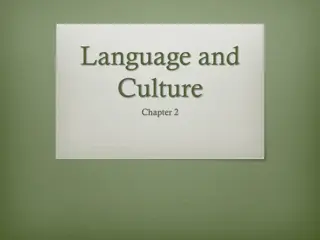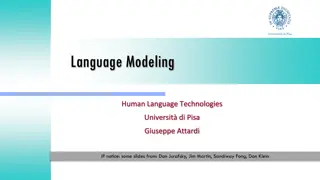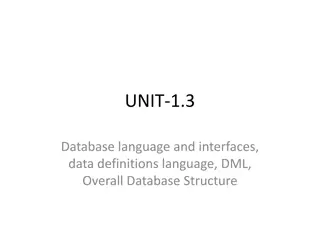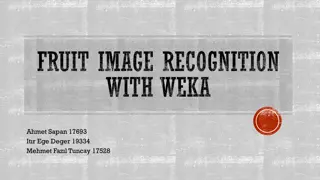Career Opportunities and Challenges in Translation & Interpreting Pedagogy Post-Pandemic
The APTIS 2022 conference explores new avenues in Translation and Interpreting (T&I) pedagogy amidst a changing landscape. Dr. Bego A. Rodriguez highlights emerging roles for T&I graduates. The context reveals a decline in language learning in the UK, impacting the Language Service Industry. The UK'
0 views • 13 slides
Graph Machine Learning Overview: Traditional ML to Graph Neural Networks
Explore the evolution of Machine Learning in Graphs, from traditional ML tasks to advanced Graph Neural Networks (GNNs). Discover key concepts like feature engineering, tools like PyG, and types of ML tasks in graphs. Uncover insights into node-level, graph-level, and community-level predictions, an
3 views • 87 slides
Language Study Community – Enhance Your Language Skills
Joining a Language Study Group is a fantastic way to take your language learning to the next level. By leveraging the power of Group Study, you can immerse yourself in the language, enhance your understanding, and build confidence in your speaking abilities. Read full article \/\/explainlearning.com
1 views • 3 slides
Modeling Scientific Software Architecture for Feature Readiness
This work discusses the importance of understanding software architecture in assessing the readiness of user-facing features in scientific software. It explores the challenges of testing complex features, presents a motivating example, and emphasizes the role of subject matter experts in validating
6 views • 20 slides
Academic Language Demands and Supports in Instructional Planning
Academic Language Demands and Supports are crucial in educational settings to ensure comprehension and usage of language by students. This content discusses embedding language demands in lesson plans, providing language supports, and peer review activities to enhance academic language skills. The fo
6 views • 10 slides
The Significance of Media in Language Learning
Media plays a crucial role in language learning by raising awareness of the ideology behind linguistic structures and providing valuable information on society and culture. Linguists are drawn to media language for research purposes and to understand its impact on language use and attitudes. Media s
11 views • 5 slides
Understanding Translation: Key Concepts and Definitions
Translation involves transferring written text from one language to another, while interpreting deals with oral communication. Etymologically, the term "translation" comes from Latin meaning "to carry over." It is a process of replacing an original text with another in a different language. Translat
11 views • 76 slides
Language and Communication in Society: Understanding Interactions
Explore the intricate relationship between language and society through lectures focusing on language in interaction, power dynamics, language contact and change, public space discourse, linguistic landscaping, and more. Delve into the shift from structural linguistics to societal communication, red
6 views • 28 slides
Best service for Feature Walls in Carrigoon Beg
Derek McNamara Joinery serves the Best service for Feature Walls in Carrigoon Beg. They prides itself on delivering superior results that exceed customer expectations. They are skilled in a wide range of carpentry, such as panelling, feature walls, radiator covers, furniture design, and using only t
1 views • 6 slides
Understanding Language: Informative, Expressive, and Directive Uses
Language serves as a vital medium for communication, allowing the conveyance of ideas, thoughts, and emotions. It is a complex phenomenon with diverse uses. This text delves into the three major divisions of language use - informative, expressive, and directive. Informative language conveys facts, w
4 views • 6 slides
Git Branching Models and Workflows
Git branching models determine how code changes are managed and integrated in software development projects. This content discusses successful branching models, emphasizing the usage of master, develop, feature, release, and hotfix branches. It also explains why Git branching is different from centr
0 views • 13 slides
Language Learning and Teaching Processes in Young Children
Development of language in young children is influenced by various factors such as their cultural and linguistic environment, unique characteristics, and interactions with adults. Optimal language development requires language stimulation from the environment. Varied cultural practices impact langua
1 views • 51 slides
Understanding Language in Stoicism: Significance and Corporeality
Language in Stoicism plays a crucial role in the process of assenting to impressions by focusing on corporeality, reason, and truth. It distinguishes between the mundane vocal sounds, articulated speech, and significant language to convey meanings effectively. The significance of language lies not i
0 views • 13 slides
Understanding Language Teaching Syllabus: Integration, Theory, and Approaches
Language Teaching Syllabus involves the integration of subject matter and linguistic elements, guided by theories of language and learning. Various approaches like Grammatical, Situational, Communicative, and Analytic are used to structure syllabi. Breaking language into parts aids in sequential lea
1 views • 28 slides
Exploring Language and Communication Through a Short Film
In this lesson, students will watch a 10-minute short film titled "The Most Beautiful Thing" by Cameron Covell. They will reflect on the value of learning another language, analyze how facial expressions and body language convey emotions, and develop empathy towards those facing language barriers or
0 views • 29 slides
Various Definitions of Language Throughout Linguistic History
Different linguists and scholars have offered various definitions of language over time. Sapir (1921) emphasized language as a method of communicating ideas, emotions, and desires through voluntary symbols. Bloch and Trager (1942) focused on the social aspect of language as a system of vocal symbols
1 views • 12 slides
Introduction to Assembly Language Syntax and Program Data
Learn about the syntax of assembly language and how data, variables, and constants are used in programming. Explore the basic instructions and the translation of high-level language into assembly language. Discover the role of an assembler in translating assembly language programs into machine langu
4 views • 36 slides
Proposal to Add National Security and Emergency Preparedness Priority Access Feature in IEEE 802.11be Amendment
The document proposes integrating the National Security and Emergency Preparedness (NSEP) priority access feature into the IEEE 802.11be standard to ensure seamless NSEP service experience, particularly in Wi-Fi networks used as last-mile access. The NSEP priority feature at the MAC layer is indepen
0 views • 12 slides
Promote Feature Adoption with Self-Service Password Reset Posters
Enhance feature adoption of self-service password reset among your employees with these ready-to-use posters. Simply customize and print them to encourage password security awareness in your workplace. Don't risk productivity downtime due to forgotten passwords – empower your team to reset their p
0 views • 13 slides
Enhancing Language Learning Across the Curriculum in B.Ed. 1st Year Course
Language Across the Curriculum (LAC) emphasizes that language learning should occur across all subjects, not just in language classrooms. It highlights the importance of incorporating language development into every learning activity, fostering multilingualism in schools. Language plays a crucial ro
2 views • 34 slides
Unleashing the Power of Feature Stories in Writing
Feature stories offer a unique way to engage readers by focusing on personal elements and timeless themes compared to the timeliness of news reports. They allow for creativity, entertainment, and emotion, broadening the storytelling landscape. Understanding the distinction between news reports and f
0 views • 9 slides
Understanding Feature Engineering in Machine Learning
Feature engineering involves transforming raw data into meaningful features to improve the performance of machine learning models. This process includes selecting, iterating, and improving features, converting context to input for learning algorithms, and balancing the complexity of features, concep
0 views • 28 slides
Understanding First Language Acquisition Process
First language acquisition is the process through which humans develop the capacity to perceive, comprehend, and effectively use language to communicate. It primarily focuses on infants acquiring their native language. Basic requirements, caregiver speech features, and the acquisition schedule play
0 views • 19 slides
Global Relevance and Redundancy Optimization in Multi-label Feature Selection
The study focuses on optimizing multi-label feature selection by balancing global relevance and redundancy factors, aiming to enhance the efficiency and accuracy of data analysis. It delves into the challenges posed by information theoretical-based methods and offers insights on overcoming limitatio
0 views • 15 slides
Comprehensive Overview of SQL Commands and Language Categories
In this detailed guide, you will learn about Structured Query Language (SQL) including its various commands such as Data Definition Language (DDL), Data Manipulation Language (DML), Data Control Language (DCL), and Transaction Control Language (TCL). Explore how SQL is used in Database Management Sy
0 views • 15 slides
Understanding the Difference Between News and Feature Photography
Differentiating between news and feature photography involves capturing specific events for news photos and unique cultural moments or human interest stories for feature photos. News photos inform viewers with concrete information, while feature photos evoke emotions and delve into a slice of life o
0 views • 24 slides
Understanding the Importance of Feature Engineering in Data Science
Feature engineering, a manual and time-consuming process, is a crucial step in data science workflows. It involves generating and transforming features based on domain knowledge. Avoiding the pitfalls of past technologies like expert systems, feature selection plays a key role in determining which f
0 views • 25 slides
Speech and Language Developmental Milestones: A Bilingual/Multilingual Perspective
Speech and language developmental milestones are crucial for children, regardless of their home language. These milestones encompass receptive language, expressive language, pragmatics, and articulation and phonology. Understanding how a child hears and talks from birth to one year is essential, as
1 views • 23 slides
Understanding .NET Framework Architecture and Common Language Runtime
This content delves into the intricacies of .NET architecture, highlighting its structure, common language runtime, and key components such as Common Type System (CTS) and Common Language System (CLS). It explains how .NET supports multiple languages, facilitates cross-language interoperability, and
0 views • 13 slides
Analyzing Writer's Language Use in English Language GCSE Component 2
In English Language GCSE Component 2, students learn to analyze how writers use language. The learning objective focuses on commenting, explaining, and analyzing language use with relevant subject terminology. The exam assesses students on their ability to interpret and explain a writer's thoughts,
0 views • 12 slides
Language and Culture Reflections: Diversity in Linguistic Emphasis
Exploring the correlation between language and culture, this content delves into how various languages reflect cultural values and priorities. Through examples like the Inuit language with rich vocabulary for snow and seals, the Shinzwani culture's unique word for mother and aunt, and the evolving l
0 views • 50 slides
Understanding Language Modeling in Human Language Technologies
Exploring the concepts of language modeling in human language technologies, this presentation delves into N-grams, the chain rule of probability, evaluation metrics like perplexity, smoothing techniques such as Laplace, and the goal of assigning probabilities to sentences. It covers applications lik
1 views • 81 slides
Feature Writing: A Narrative Journey Through Unique Characters and Stories
Dive into the world of feature writing, where journalistic articles take on a narrative approach to captivate readers. Explore the lives of individuals like Miley, Amy, Natasia, and Monica, each with their own compelling stories and experiences. From Harry Potter fans to Japanese tea party organizer
0 views • 51 slides
Introduction to Language Technologies at Jožef Stefan International Postgraduate School
This module on Knowledge Technologies at Jožef Stefan International Postgraduate School explores various aspects of Language Technologies, including Computational Linguistics, Natural Language Processing, and Human Language Technologies. The course covers computer processing of natural language, ap
0 views • 27 slides
Exploring Sociolinguistics: Language Variation and Social Factors
Sociolinguistics delves into the study of language variation influenced by social factors, examining the relationship between language and its social context. It explores various aspects like standard pronunciation, language choice, speech acts, language components, language variety, and factors suc
0 views • 73 slides
Understanding Assembly Language Programming for Computing Layers
Assembly language is a low-level programming language that enables direct interaction with a computer's hardware components. This content explores the fundamentals of assembly language, the relationship between human-readable machine language and binary code, an assembly language program for multipl
0 views • 31 slides
Database Language and Interfaces Overview
A database management system (DBMS) requires appropriate languages and interfaces to handle queries and updates for data manipulation and control. This includes Data Definition Language (DDL), Data Manipulation Language (DML), Data Control Language (DCL), and Transaction Control Language (TCL). Each
0 views • 12 slides
Understanding Language Anxiety in Foreign Language Learning and Teaching
Explore the impact of language anxiety on students and teachers in foreign language learning and teaching contexts through insights from Dr. Christina Gkonou's research. Delve into the theoretical background, implications for language education, and real-life experiences shared at the Essex Language
0 views • 25 slides
Fruit Image Recognition with Weka: Methods & Results
Fruit image recognition project with Weka involved testing various classification methods using deep-learning techniques for feature extraction and achieving accurate results. Methods included ZeroR, J48 decision tree, and feature manipulation to improve classification accuracy levels. Results showe
0 views • 12 slides
Helpful Assistant: Create Title, Summary, Tags, and Language
In this task, you will create a title, summary, tags, and detect the language from the given content. Be concise in summarizing the content and select appropriate tags for better categorization. The language detection feature will help in identifying the language of the provided content accurately.
0 views • 10 slides









